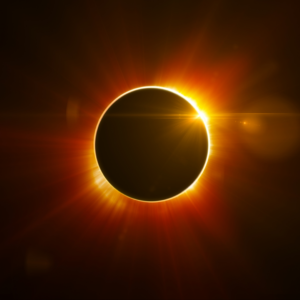Protecting Your Eyes During the April 8th Solar Eclipse

With the upcoming solar eclipse set to grace the sky on April 8th, many of us are eagerly anticipating this celestial event.
However, it’s crucial to remember that observing a solar eclipse directly can pose serious risks to our eyesight. At Tri-County Eye Care, we prioritize your eye health and want to ensure you enjoy this rare phenomenon safely. Here’s a comprehensive guide on how to protect your eyes during the solar eclipse.
Understanding the Risks
Looking directly at the sun, even during a partial eclipse, can lead to damage to the retina—a condition known as solar retinopathy. This occurs when the intense light from the sun overwhelms the light-sensing cells in the retina, causing permanent vision loss.
Safe Viewing Practices
1. Solar Eclipse Glasses: The most effective way to observe a solar eclipse is by using certified solar eclipse glasses. These specialized glasses are equipped with solar filters that block out harmful ultraviolet and infrared radiation, allowing you to view the eclipse safely.
2. Pinhole Projector: If you don’t have access to solar eclipse glasses, you can create a pinhole projector using simple household items. This DIY projector allows you to indirectly view the eclipse by projecting the image onto a surface.
3. Telescopes and Binoculars: Never look at the sun through telescopes, binoculars, or cameras without proper solar filters. Doing so can magnify the sun’s rays and cause severe eye injury.
Additional Tips
- Monitor Children: Supervise children during the eclipse to ensure they follow safe viewing practices.
- Limit Viewing Time: Prolonged exposure to the sun, even during an eclipse, can cause harm. Take breaks and give your eyes rest.
- Stay Informed: Keep up-to-date with safety guidelines and recommendations from reputable sources like Tri-County Eye Care.
As we eagerly await the solar eclipse on April 8th, let’s prioritize our eye health and follow safe viewing practices to enjoy this awe-inspiring event without risking our vision. Remember, at Tri-County Eye Care, your vision is our top priority. Stay safe, protect your eyes, and savor the beauty of the cosmos responsibly.
For more eye care tips and professional guidance, feel free to reach out to the experts at Tri-County Eye Care. Wishing you a safe and enjoyable solar eclipse viewing experience!
